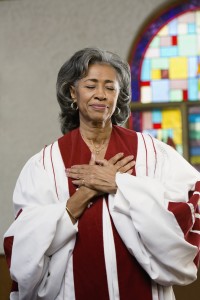
March is Women’s History Month. Although the first celebration of International Women’s Day was held in 1911, the actual event didn’t really pick up steam until the late ’70s. Congress was making attempts to ratify the Equal Rights Amendment, which was unable to get enough support. In its wake, President Carter proclaimed a week in March, 1980, as Women’s History Week. He asked schools and libraries to focus on women who made a difference in the nation’s history, such as Sojourner Truth, Harriet Tubman, Susan B. Anthony, and Lucretia Mott. Over the next decade, states proclaimed March as Women’s History Month, with Congress and the U.S. Government supporting those efforts.
Where Are the Women in Religion?
Pew Research Center looked at leadership in nine major religious organizations which ordained women. Currently, only two organizations have women in top leadership positions. In the American Baptist Churches USA, Susan Gillies is the interim general secretary. In the Evangelical Lutheran Church in America, the presiding bishop is Elizabeth Eaton. The past doesn’t look much better. Rosemarie Wenner served as the president of the council of bishops of the United Methodist Church, while the Episcopal Church had a woman, Katharine Jefferts Schori, as its presiding bishop until 2015.
There are still religions in the United States which won’t ordain women or allow them to hold leadership positions in the church. Pew Research Center found that about 60 percent of Catholics support the ordination of women, although the Roman Catholic Church does not currently do that. In the Church of Jesus Christ of Latter-Day Saints, women are not ordained, and almost 90 percent of both men and women would not support women serving as an LDS priest.
Breaking the Glass Ceiling
The leadership in many faiths seem to have forgotten that women were instrumental in their history. In Jewish tradition, Queen Esther saved the Jews from slaughter at the hand of Haman. Miriam and Deborah were prophetesses to the people. Rachel and Leah were the matriarchs of the twelve tribes. Women are the ones who give birth, making them directly responsible for every man who was ever born.
In the Christian tradition, not only were there many biblical figures who factored into the early church, there have been many women in history who helped preserve the traditions and influenced the development of Christianity. Fanny Crosby wrote more than 8,000 hymns, such as “Blessed Assurance,” many of which are still highly revered today. Evangeline Booth served as the fourth general of the Salvation Army, increasing its work throughout the world. She took office when she was 69, and she never let age hold her back. Mary Baker Eddy is considered the founder of the Christian Science church. At 87, she was still going strong and founded the daily newspaper for her followers.
Today’s Religious Women Making a Difference
The Rev. Dr. Emilie M. Townes serves as the dean of Vanderbilt Divinity School, and has helped to pioneer the field of womanist theology. Margot Adler joined NPR in 1979 as a correspondent Wiccan priestess. She’s authored a book and continues her research of Pagan culture. Rabbi Sharon Kleinbaum is highly regarded as a Jewish rabbi, and she serves as the leader of Congregation Beit Simchat Torah, which is known as the LGBT synagogue. Malala Yousufzai, a Pakistani activist for women and girls, is the youngest person ever to receive the Nobel Peace Prize. Joyce Meyer, of Joyce Meyer Ministries reaches thousands of men and women through her organization, not just within the United States, but internationally. She is one of the world’s leading Bible teachers.
Women are making a difference in religion, but they are still finding it difficult to serve as leaders. Take a few minutes this month to thank those women who have been part of your spiritual journey. Let someone know how much she has meant to you.

